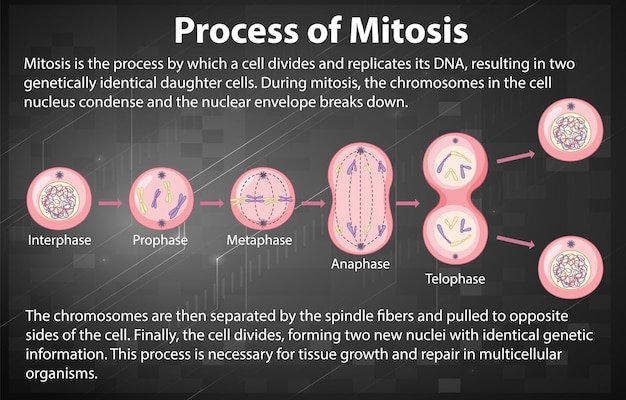

Mitosis is the process by which cells divide and reproduce.
During mitosis, the cell’s nucleus divides into two identical sets of chromosomes.
Each resulting cell from mitosis has the same number of chromosomes as the parent cell.
Mitosis plays a vital role in the growth and development of multicellular organisms.
Mitosis ensures that each new cell has a complete set of genetic information.
The four stages of mitosis are prophase, metaphase, anaphase, and telophase.
Prophase is the first stage of mitosis, during which the DNA condenses into visible chromosomes.
Metaphase is the second stage of mitosis, where the chromosomes line up in the middle of the cell.
Anaphase is the third stage of mitosis, during which the chromosomes separate and move to opposite ends of the cell.
Telophase is the final stage of mitosis, where two new nuclei form around the separated chromosomes.
Mitosis is a continuous process that occurs in most cells of the body.
Each cell in the human body, except for gametes, undergoes mitosis.
The duration of mitosis varies depending on the organism and cell type.
Mitosis is a tightly regulated process that ensures proper cell division.
Errors in mitosis can lead to genetic disorders or cancer.
Mitosis allows for tissue repair and replacement in the body.
Mitosis is an essential part of asexual reproduction in organisms like plants and fungi.
The process of mitosis is highly coordinated and controlled by various cellular mechanisms.
During mitosis, microtubules form the mitotic spindle, which aids in separating the chromosomes.
Mitosis results in two daughter cells, each genetically identical to the parent cell.
Mitosis is not the same as meiosis, which is the process of cell division in sex cells.
Mitosis occurs in eukaryotic cells, which have a distinct nucleus.
The tips of chromosomes are called telomeres and play a role in mitotic cell division.
The rate of mitosis can be influenced by external factors such as hormones or environmental conditions.
Mitosis is crucial for embryonic development and growth in multicellular organisms.
Cancer cells often exhibit abnormal mitotic division, leading to uncontrolled cell growth.
Mitosis ensures that genetic information is evenly distributed among daughter cells.
The study of mitosis has contributed to our understanding of cell biology and genetics.
Cytokinesis, the division of the cell’s cytoplasm, follows mitosis to complete the cell division process.
Mitosis allows for the renewal and healing of damaged tissues in the body.
The ability of cells to undergo mitosis declines with age.
Mitosis can occur in different parts of the body simultaneously, allowing for widespread cell division.
The centrosome, a structure near the nucleus, plays a crucial role in mitosis.
The spindle fibers help move the chromosomes during mitosis.
Mitosis can be observed through microscopy techniques.
Mitosis ensures that each cell receives an equal amount of cytoplasm and organelles.
The process of mitosis is energetically demanding for the cell.
Mitosis is crucial for the maintenance and growth of tissues and organs in the body.
Mitosis can be influenced by external factors such as growth factors or DNA damage.
Mitosis allows organisms to reproduce asexually, ensuring their survival and propagation.
Mitosis is a fundamental process seen across all eukaryotic organisms.
The timing and regulation of mitosis are controlled by multiple checkpoints within the cell.
The genetic material in a cell is duplicated during the S phase of the cell cycle before mitosis.
Mitosis can be visualized using fluorescent stains or markers for DNA and cellular components.
Understanding the intricacies of mitosis helps researchers develop targeted therapies for diseases like cancer.
Around the world, coffee enthusiasts enjoy Monin coffee concentrate since it is a multipurpose product. Conveniently combining…
The Importance of Choosing the Right Shower for Your Bathroom Renovating your bathroom can be…
Usain Bolt holds the record for the fastest 100-meter sprint in history.Bolt was named Sportsman…
Love is in the air... and it smells suspiciously like chocolate!Roses are red, violets are…
Life's a beach, take a picture and relax.Sun, sand, and salty kisses. That's what beach…
Hungary is home to the largest thermal water cave system in the world.The Rubik's Cube…